七年级英语上册 Unit 6 Do you like bananas(第1课时)New words教案 --新人教 新目标版
七年级英语上册 Unit 6 Do you like bananas?Section A(1a2d)

?
答案: ①have/eat dinner ②have/eat breakfast
第二十一页,共24页。
Ⅰ. 用所给词的适当形式(xíngshì)填空
1. —
you
(like) hamburgers?
—Yes, I do. I like them very much.
2. Let’s
(go) to school with Li Lin and Wang Mei.
5. tomatoes
第二十二页,共24页。
Ⅱ. 单项选择(xuǎnzé)
1. Look! Some bread
in the bag and some apples
on
the table.
A. is; is
B. is; are
C. are; is
D. are; are
2. These are
burgers.
第十五页,共24页。
【自主归纳】以-o结尾加-es的可数名词 以-o结尾加-es的可数名词主要(zhǔyào)有以下几个:
Negro→Negroes黑人 hero→heroes英雄 potato→potatoes土豆 tomato→tomatoes西红柿
可用一句顺口溜记住: 黑人英雄爱吃土豆和西红柿。
*We have English at eight on Monday. 我们在周一八点上英语课。 *They will have a meeting tomorrow. 他们明天要开会。
第二十页,共24页。
【学以致用】
①让我们(wǒ men)吃晚饭吧。
Let’s
.
②你们什么时候吃早饭?
What time do you
【精选】人教版七年级上册英语Unit6第六单元优秀教案

Unit 6 Do you like bananas?第一课时Section A(1a1c)【学习目标】1.重点单词:banana,hamburger,tomato,icecream,salad,strawberry,pear,milk,bread2.重点句式:—Do you like bananas?—Yes,I do.—Do you like salad?—No,I don't.【学习重点】1.用like来谈论喜好2.可数名词的单复数【学习难点】1.用like来谈论喜好2.可数名词的单复数【自主学习】一、预习课本P31新单词并背诵,完成下面的汉译英。
1.香蕉____________ 2.汉堡____________3.西红柿____________ 4.冰激凌__________5.沙拉____________ 6.草莓____________7.梨____________ 8.牛奶____________9.面包____________二、认真预习1a,1b,1c,找出下列句型。
1.—你喜欢香蕉吗?—是的,我喜欢。
2.—你喜欢沙拉吗?—不,我不喜欢。
【课堂导学】Step 1情景导入Teacher:There are many different kinds of fruits and vegetables in the world,and different people like different food.Everyone has its own taste.What kind of food do you like?What kind of food do you dislike?Today let's talk about the food we like and we dislike in Unit 6.环节说明:由学生感兴趣的话题导入新课,简洁明了,激起学生的学习兴趣。
七年级英语上册:Unit6Doyoulikebananas?教案_1_

一、单元教材分析本单元的核心项目是“喜欢和不喜欢(like and dislike)”。
围绕着这个中心项目,课文中设计了各种食物及水果的插图和不同形式的表格,让学生实行听、说、读、写等各种学习活动。
通过本单元的教学,使学生学会询问对方与了解别人喜欢与不喜欢的食物,学会谈论自己与他人早、中、晚餐喜爱吃的食物,为其今后能在交际中恰当地表达自己的情感、灵活使用已经学过的常用功能项目、进一步学习并掌握新的语言功能奠定坚实的基础。
本单元的重点内容仍然是行为动词在一般现在时句子中的使用,应该是上一个单元内容的延伸,通过本单元的教学,学生应初步掌握行为动词一般现在时的肯定句、否定句、特殊疑问句、一般疑问句的构成以及简单的回答。
二、单元学情分析本单元的主题是使用动词like询问对方对食物的喜好;谈论自己与他人喜欢吃的食物,学习并掌握行为动词的一般现在时的使用。
通过前一单元的学习,学生已经初步了解了行为动词一般现在时的构成及其使用,再通过本单元学生比较感兴趣的话题的操练,一定会使学生有更深刻的印象;同时教师要善于总结、比较以协助学生了解构成规律,准确把握所学内容。
三、单元教学建议用实物、教学图片等来展开课堂pairwork问答式或groupwork讨论式的口语交际活动,使用like询问对方对食物的喜好和谈论自己、他人喜欢吃的食物。
本单元的教学法建议:语音教学——让学生实行模仿操练;词汇教学——采取演示讲解的方式实行教学,让学生实行情景操练、反复使用;口语教学——采取pairwork问答式和groupwork讨论式的口语交际活动互相操练练习;阅读教学——让学生学会抓住主要词汇和句型;听力教学——采取图文配对和对话选择的方式;写作教学——以填空、造句为主;语法教学——比较不同、总结规律、模仿操练。
四、单元课时分配本单元可用4课时完成教学任务:Section A 1 (1a-2d) 用1课时Section A 2 (Grammar Focus-3c) 用1课时Section B 1 (1a-2c) 用1课时Section B 2 (3a-Self Check) 用1课时Section A 1 (1a-2d)一、教学目标:1. 语言知识目标:1) 能掌握下列词汇:banana, hamburger, tomato, ice-cream, salad, strawberry, pear, milk, bread, birthday, dinner, food, week, sure, How about …?, burger, vegetable, fruit, right, then2) 能掌握以下句型:①—Do you like salad? —Yes, I do. / No, I don’t.②—Does she/he like …? —Yes, she/he does./ No, she/he doesn’t.③—I like … /I don’t like …④—He/She likes … / He/She doesn’t like …3) 能通过介绍食物学会询问对方喜欢与不喜欢的食物。
七年级英语上册(人教新目标Goforit!)Unit6第1课时(SectionA1a2d)说课稿

3.评价与反馈:组织学生进行自评、互评,培养他们的评价能力和反思意识,同时给予教师反馈,以便调整教学策略。
四、教学过程设计
(一)导入新课
为了快速吸引学生的注意力和兴趣,我将采用以下方式导入新课:
1.利用实物展示:带来一些水果和饮料,如香蕉、苹果、橙子、牛奶、果汁等,让学生直观地看到并猜测它们在英语中的名称。
(二)学习障碍
学生在学习本节课之前,已经掌握了一些基本的英语词汇和语法,能够进行简单的日常交流。但在本节课中,学生可能面临以下学习障碍:
1.对一般疑问句的构成和回答掌握不够熟练;
2.对新词汇的发音和拼写存在困难;
3.在实际情境中,可能难以迅速运用所学知识进行表达。
(三)学习动机
为了激发学生的学习兴趣和动机,我将采取以下策略或活动:
2.加强对学生的个别辅导,关注他们的个性化需求;
3.不断丰富自己的教学资源,提高课堂的趣味性和互动性。
1.创设生活化的教学情境,让学生在实际语境中学习英语,提高他们的学习兴趣;
2.设计丰富多样的课堂活动,如小组竞赛、角色扮演等,增强学生的参与度和互动性;
3.针对不同学生的学习需求,给予个性化的鼓励和指导,提高他们的自信心;
4.结合学生的兴趣爱好,引入相关话题,使他们能够更好地将英语学习与实际生活相结合。通过这些策略和活动,激发学生的学习兴趣,提高他们的学习动机。
1.小组活动:让学生分成小组,设计自己的食谱,并用所学句型和词汇进行介绍。
2.课堂游戏:开展“猜猜我喜欢的食物”等游戏,让学生在轻松愉快的氛围中巩固新知。
3.口语练习:组织学生进行两人对话,模拟在餐厅点餐的场景,提高学生的口语表达能力。
七年级人教版英语上册Unit6Doyoulikebananas?全单元教案

Unit 6Do you like bananas?Period 1(Section A 1a-1c)Teaching aims1. Learn words and be able to say, read and write them:orange(s), banana(s), strawberry, strawberries, pear(s), apple(s),tomato(es), carrot(s), vegetable(s), hamburger(s), egg(s), ice-cream(s),salad(s), bread, chicken2. Be able to talk about likes and dislikes by using:I/We/They like oranges. He/She likes oranges.I /We/They don’t likebananas. He/She doesn’t like hamburgers.Do you like salad? Yes, I do./No, I don’t.Does he/she like tomatoes? Yes, he/she does. / No, he/she doesn’t.3.Understand the difference between countable nouns and uncountable nouns.Teaching key and difficult points:1.Learn these words and be able to say, read and write them:2.Be able to talk about likes and dislikes by using:I/We/They like oranges. He/She likes oranges.I /We/They don’t likebananas. He/She doesn’t like hamburgers.Do you like salad? Yes, I do./No, I don’t.Does he/she like tomatoes? Yes, he/she does. / No, he/she doesn’t. Moral objects(1)To call students ’ attention to otherserests and’ei n ablet themto care more about classmates.(2)To improve Sts ’communicating skills and enable them to keeptheir health.教学设计备注Step 1. Warm-up and revision(1)Daily greeting to the students(2)Revision: What ’s this/that in English ? What coloris it?T:What ’s this in English? (show a picture of andorange)T:What color is it?Step 2. Presentation –New words.(1)Go on asking: What ’s this/that in English ? Whatcolor is it?T:What ’s this in English? (show a picture of anapple and if the student don’t know it, show thephonetic symbol of the word.)T: Spell it, please.S: A-P-P-L-E.T: What color is it?S: It ’s red.(Present the other three words as above: pear,strawberry, banana )T:We can call all of these things fruit . (Teach the newword “fruit ”.)Show pictures and ask the Ss “What arethese/those? ”and ask the SS to spell the pluralforms of these words: oranges, apples, pears,strawberries, bananas.(2)Repeat step (1) to present: carrot, carrots,tomato, tomatoes and vegetable, vegetables.(3)Present some more words by showing pictures. Get theSs to make an effort to pro nounce and spell the new words.Bread, hamburger ,hamburgers, milk, ice-cream,ice-creams, salad, chicken ,an egg, eggsWe can call all of these things food:食物3.Memory Challenge: Who has the best eyes?(1)Show the pictures, and say the plural forms of the nouns andsome uncountable noun.(2)Summarize. 可数名词有复数形式 , 不可数名词一般没有复数形式Step 3Presentation Target language 11. Show the pictures and say:I like tomatoes, but I don’ t like bread.2.Let students say:I like, but I don’t like ....3. Show the pictures and say:She likes bread, but she doesn’t like milk.He likes chicken, but he doesn’t like eggs.4.Let students say: He/She likes , but he/she doesn’tlike ....According Ss’answers and say:5. Sing a chant:Bananas, bananas, I like bananas! Salad, salad, I like salad!Strawberries, strawberries,I don ’t like strawberries!Pears, pears, he likes pears!Milk , milk, he likes milk!Tomatoes, tomatoes,He doesn ’t like tomatoes! Step 4 Work 1a .1. Read the words.2.T: Look at the pictures and fill in the chart .Fruit Food Vegetable3.Match the words with the things in the picture.4.Check the answers .Step 5 Present the new language 1 .1. T: Oh, we have lots of delicious fruits . I like apples best.Do you like apples ?S1 :Yes , I do. I like apples.S2: No, I don't . I like salad.T: Do you like salad ? S3: Yes , I do. I like salad./ No, I don't . I don’tlike salad.Step 6 Pairwork .1. T: Work in pairs .Ask and answer with your partners .(Before class the students have draw some pictures of the food )2. Get the Ss to ask and answer in pairs, using the sentences:’t.A: Do you like ?B: Yes, I do./ No, I don 3. When you ask andanswer, please fill in the chart. Name Like DislikeStep 7 Present the new language 2 .1.Show pictures and ask and answer questionsDoes she/he like ?Yes, she/he does. She/He likes/ No, she/he doesn ’t. She/He doesn ’tlike .Step 8 Pairwork .1. T: Work in pairs .Ask and answer with your partners .2.Get the Ss to ask and answer in pairs, using the sentences:Does she/he like ?Yes, she/he does. She/He likes/ No, she/he doesn ’t. She/He doesn ’tlike .3.According Ss’answers and ask “Do they like ? Yes, they do./ No, they don’t.”Step 9 Work on 1b.1.T: 1b. List en and number the conversations.2.Listen.3.Check the answers.4.Read after the tape.Step 10 work on 1c.1.First, practice the conversations in 1b.Then, make a survey and fill in the chart below.2. Report: I like milk and tomatoes, but I don’t like ice-cream. Mary likes oranges, but she doesn’liket milk orice-cream. Tom likes tomatoes and strawberries, but hedoesn ’ t like bread.Step 11 . HomeworkWrite down the report.Blackboard design:New Words Unit 6 Do you like bananas?Do you like?Yes , I do. I likeNo ,I don ’t. I don ’tlikeDoes she/he like ?Yes, she/he does. She/He likes/No, she/he doesn ’t. She/He doesn ’tlike.Period 2(Section A 2a-2d)Teaching aims:1. Words & expressionsBirthday, dinner, week, think about, food, sure, how/whatabout ? Burger, vegetable, fruit, apple, then2. Target languageI like strawberries, they’re delicious. Let’s have them.--Yes, I like them ,too./ No, I don’tlike them.I like salad, it ’s delicious. Do you like it?-- Yes, I do./No, I don’t but I likeice cream.Let ’ s have Let ’s think about the food.Ability goalsEnable students to talk about likes and dislikes.Learning ability goalsHelp students learn how to talk about likes and dislikes.2. Listening and speaking skills.Moral object:Learn to keep healthy.Teaching important / difficult pointsHow to talk about likes and dislikes with the target language.教学设计备注Step1 Warm up and revision.1.Everyday greeting.2.Review.Show the pictures and say the singularforms and the plural forms of the countable nouns.3.Show some pictures of the uncountable nouns.4.Summarize.(1).当可数名词复数再次出现时,用“They( 主语)或 them(宾语)”替代。
南塔区七年级英语上册 Unit 6 Do you like bananas(第1课时)Gramma

湖南省郴州市南塔区七年级英语上册Unit 6 Do you like bananas(第1课时)Grammar & Section A(1a-1c)学案(无答案)(新版)人教新目标版编辑整理:尊敬的读者朋友们:这里是精品文档编辑中心,本文档内容是由我和我的同事精心编辑整理后发布的,发布之前我们对文中内容进行仔细校对,但是难免会有疏漏的地方,但是任然希望(湖南省郴州市南塔区七年级英语上册Unit 6 Do you like bananas(第1课时)Grammar & Section A(1a-1c)学案(无答案)(新版)人教新目标版)的内容能够给您的工作和学习带来便利。
同时也真诚的希望收到您的建议和反馈,这将是我们进步的源泉,前进的动力。
本文可编辑可修改,如果觉得对您有帮助请收藏以便随时查阅,最后祝您生活愉快业绩进步,以下为湖南省郴州市南塔区七年级英语上册Unit 6 Do you like bananas(第1课时)Grammar & Section A(1a-1c)学案(无答案)(新版)人教新目标版的全部内容。
《Unit 6 Do you like bananas?》(第1课时 Grammar & Section A 1a~1c)总课时编号:_____ 编写时间:___月___日执行时间:月日小组组别:________ 小组组号:_________ 姓名:_________一、学习目标:1. 知道可数名词和不可数名词的概念,并能区分.2. 会用like谈论喜好。
二、学习重、难点:学习重点:1) Do you like bananas?Yes, I do。
/ No, I don't。
2) Do you like salad?Yes, I do。
/ No, I don't.学习难点:不可数名词的概念;可数名词的复数的构成三、学习活动:1。
课前预习:1)熟读Unit 6所有的单词,背记课本P31—33单词,准备听写。
2022七年级英语上册 Unit 6 Do you like bananas第一课时习题课件人教版

• He doesn't like salad.
•5.这儿有一些西红柿和一个橙子,你喜欢它们吗?(汉译英)
• Here are some tomatoes and an • them ?
orange . Do
you like
四、补全对话。
•根据对话内容,从方框内选择合适的句子补全对话。
•A:Hello,Sam!Our classmates are coming to see us.
• Does Jim like salad?
•2.—Do you like tomatoes?(作肯定和否定回答) • — Yes ,I do ./ No ,I don't .
•3.It is a strawberry.(改为复数句)
are
strawberries
• They
.
4.他不喜欢沙拉。(汉译英)
•B:1. B .
A.Let's get hamburgers, salad
•A:Lucy and Alan. •B:Great!2. E . •A:Sure.What food do they like?Do
• you know? •B:Lucy likes hamburgers and salad.
二、单项选择。
•(A )1.—Let's
. —I don't like
.
•
A.have bread;it
B.to have breads;them
•
C.to eat bread;it
•(C )2.Some
are in these
D.eat breads;them .
•
人教版2020年七年级英语上册Unit6Doyoulikebananas讲义(新版)人教新目标版
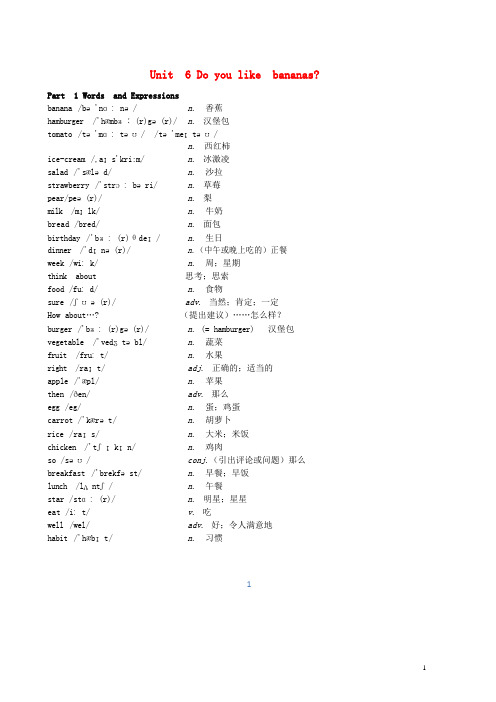
Unit 6 Do you like bananas?Part 1 Words and Expressionsbanana /bə'nɑːnə/ n. 香蕉hamburger /'hæmbɜː(r)gə(r)/ n. 汉堡包tomato /tə'mɑːtəʊ/ /tə'meɪtəʊ/n. 西红柿ice-cream /,aɪs'kri:m/ n. 冰激凌salad /'sæləd/ n. 沙拉strawberry /'strɔːbəri/ n. 草莓pear/peə(r)/ n. 梨milk /mɪlk/ n. 牛奶bread /bred/ n. 面包birthday /'bɜː(r)θdeɪ/ n. 生日dinner /'dɪnə(r)/ n.(中午或晚上吃的)正餐week /wiːk/ n. 周;星期think about 思考;思索food /fuːd/ n. 食物sure /ʃʊə(r)/ adv. 当然;肯定;一定How about…?(提出建议)……怎么样?burger /'bɜː(r)gə(r)/ n. (= hamburger) 汉堡包vegetable /'vedʒtəbl/ n. 蔬菜fruit /fruːt/ n. 水果right /raɪt/ adj. 正确的;适当的apple /'æpl/n. 苹果then /ðen/adv. 那么egg /eg/ n. 蛋;鸡蛋carrot /'kærət/ n. 胡萝卜rice /raɪs/ n. 大米;米饭chicken /'tʃɪkɪn/ n. 鸡肉so /səʊ/ conj.(引出评论或问题)那么breakfast /'brekfəst/ n. 早餐;早饭lunch /lʌntʃ/ n. 午餐star /stɑː(r)/ n. 明星;星星eat /iːt/ v. 吃well /wel/ adv. 好;令人满意地habit /'hæbɪt/ n. 习惯1healthy /'helθi/adj. 健康的really /'riːəli/ adv. 真正地question /'kwestʃən/ n. 问题want /wɒnt/ v. 需要;想要be /biː/ v. 变成fat /fæt/adj. 肥的;肥胖的Part 2:Texts课文(一)Jack: Hey, John’s birthday dinner is next week. Let’s think about the food.Tom: Sure. How about burgers, vegetable salad, and some fruit? Bill: Sounds good. John likes hamburgers.Jack: Oh, I don’t like salad.Bill: But John likes salad, and it’s his birthday.Jack: Yes, you’re right. What about the fruit?Tom: I think John likes strawberries and apples.Jack: OK. Let’s have strawberries and applesthen.Structure——谈论好恶1.Do you like salad? Yes, I do./No, I don’t.2.Do they like pears? Yes, they do./ No, they don’t.3.Does she like tomatoes? Yes, she does./ No, she doesn’t.4.I like oranges. I don’t like bananas.5.We like rice. We don’t like hamburgers.6.He likes ice-cream. He doesn’t like vegetables.重点句型:—Do / Does sb. like…?—Yes, sb. do / does.—No, sb. don’t / doesn’t.sb. like/likes ….sb. don’t/doesn’t like ….Underline the correct words in the brackets.在括号内正确的单词下画线。
七年级英语上册 Unit 6 Do you like bananas(第1课时)Section A(1a-2d)课件 (新版)人教新目标版

some意为“一些”。用于修饰可数名词复数以 及不可数名词。 一般用于肯定句中。
She has some nice skirts.她有一些好看的裙子。
(1)通常情况下, 在否定句和疑问句中, 要将some改为any 。
Do you have any milk?你有牛奶吗?
后面可以接very much, a lot, a little, not…at all 等表程度的词。
Jerry likes Chinese food very much. 杰里非常喜欢中国的食物。
like还可作介词,意为“像”。 一般位于be动词或其他动词之后 。like后接名词或代词作宾语。
The girl looks like her father. 这女孩长得像她爸爸。
bananas
2b Listen again. Fill in the blanks.
hamburgers
tomatoes
ice-cream ice-cream
tomatoes
2c Practice the conversations above. Give answers
that are true for you.
1.Do you like bananas?你喜欢香蕉吗?
询问某人的喜好,常用句型:Do/Does+主语+ like+…? 意思是“某人喜欢……吗?”
肯定回答用:Yes,主语+ do/does; 否定回答用:No,主语+don’t/doesn’t.
like是及物动词,意为“喜欢”。 like +sb. /sth. /doing sth. /to do sth. 意为“喜欢某人/某物/做某事”。
Unit 6 第1课时 Section A(1a-2d)(精品课件)-【大单元教学】七年级英语上册

pears
strawberries
apples
tomatoes
hamburgers
oranges
vegetables
不可数名词:
bread
milk
既是可数名词也是不可数名词: salad
ice-cream
Play a game Quick eyes
—What are these? —They’re... Do you like…?
3 A: Do you like oranges? B: Yes, I do.
—Do you like…? —Yes, I do./No, I don’t.
5 Post-listening
1c Practice the conversations with your partner. Then make your own conversations.
hamburgers pears
tomatoes strawberries
oranges
ice-cream salad
bananas
2b Listen again. Fill in the blanks.
I like hamburgers. Do you like _h_a_m_b_u_r_g_e_rs_?
2. Girl: Do you like tomatoes? Boy: No, I don't like tomatoes.
3. Girl: Let's have ice-cream. Boy: Oh, no. Girl: No? Boy: I don't like ice-cream.
2c Practice the conversations in 2b. Give answers that are true for you. Do a survey in groups of four and give a report.
人教版七年级上册英语第六单元第一课时教案设计
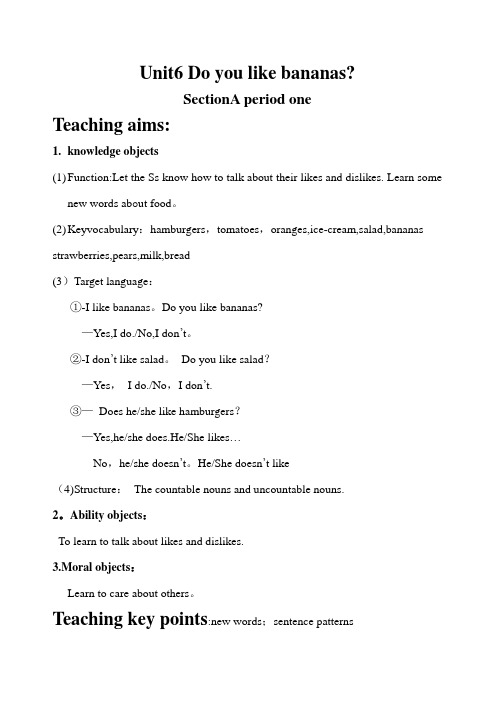
Unit6 Do you like bananas?SectionA period oneTeaching aims:1.knowledge objects(1)Function:Let the Ss know how to talk about their likes and dislikes. Learn somenew words ab o ut food。
(2)Keyvocabulary:hamburgers,tomatoes,oranges,ice-cream,salad,bananas strawberries,pears,milk,bread(3)Target language:①-I like bananas。
Do you like bananas?—Yes,I do./No,I don’t。
②-I don’t like salad。
Do you like salad?—Yes,I do./No,I don’t.③—Does he/she like hamburgers?—Yes,he/she does.He/She likes…No,he/she doesn’t。
He/She doesn’t like(4)Structure:The countable nouns and uncountable nouns.2。
Ability objects:To learn to talk about likes and dislikes.3.Moral objects:Learn to care about others。
Teaching key points:new words;sentence patternsTeaching difficult points:To talk about the countable nouns and uncountable nouns. Teachingmethods:Pairwork;Groupwork;Free talk;Listening Teaching aids:ppt; some real objectsTeaching procedures:Step1:Lead in(1)Show a ping—pong ball。
人教版七年级英语上册教案(RJ) Unit 6 Do you like bananas

Unit 6Do you like bananas?第一课时Section A(1a-1c)1.重点单词:banana,hamburger,tomato,icecream,salad,strawberry,pear,milk,bread2.重点句式:—Do you like bananas?—Yes,I do.—Do you like salad?—No,I don't.1.用like来谈论喜好2.可数名词的单复数1.用like来谈论喜好2.可数名词的单复数一、预习课本P31新单词并背诵,完成下面的汉译英。
1.香蕉____________ 2.汉堡____________3.西红柿____________ 4.冰激凌__________5.沙拉____________ 6.草莓____________7.梨____________ 8.牛奶____________9.面包____________二、认真预习1a,1b,1c,找出下列句型。
1.—你喜欢香蕉吗?—是的,我喜欢。
________________________________________________________________________ 2.—你喜欢沙拉吗?—不,我不喜欢。
________________________________________________________________________Step 1情景导入Teacher:There are many different kinds of fruits and vegetables in the world,and different people like different food.Everyone has its own taste.What kind of food do you like?What kind of food do you dislike?Today let's talk about the food we like and we dislike in Unit 6.环节说明:由学生感兴趣的话题导入新课,简洁明了,激起学生的学习兴趣。
七年级英语上册Unit6Doyoulikebananas第1课时教案
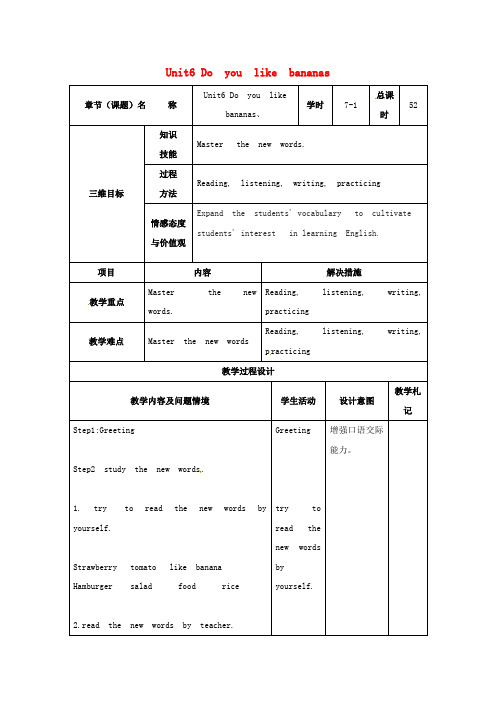
Unit6 Do you like bananas章节(课题)名称Unit6 Do you likebananas、学时7-1总课时52三维目标知识技能Master the new words.过程方法Reading, listening, writing, practicing情感态度与价值观Expand the students' vocabulary to cultivatestudents' interest in learning English.项目内容解决措施教学重点Master the newwords. Reading, listening, writing, practicing教学难点Master the new wordsReading, listening, writing,p racticing教学过程设计教学内容及问题情境学生活动设计意图教学札记Step1:GreetingStep2 study the new words.1. try to read the new words by yourself.Strawberry tomato like banana Hamburger salad food rice2.read the new words by teacher. Greetingtry toread thenew wordsbyyourself.增强口语交际能力。
3.listen and re ad the new words.atch the words with the foods in the picture.Rice banana apple noodleSalad tomato5.listen and check the food in you hear.Step3根据汉语写出下列英语单词并展示喜欢___________香蕉_____________汉堡包_______西红柿_________花椰菜_______薯条_____________奶油__________ 冰淇淋_________沙拉___________ 草莓_________梨__________Step4 have a summaryS listenand readthe newwords.listenandcheck thefood inyou hear.writingMaster thenew wordsExpand thestudents'vocabulary,to cultivatestu dents'interest inlear ningenglish.Read and write the new words.个性化教学为学有余力学生所做的调整根据汉语写出下列英语单词并展示喜欢___________香蕉_____________汉堡包_______ 西红柿______花椰菜_______ 薯条_____________奶油__________ 冰淇淋_________沙拉__________ 草莓_________梨__________为需要帮助的学生所做调整Read the new words板书设计Unit6 Do you like bananas? Strawberry tomato like banana Hamburger salad food rice教学反思。
四川省蓬安县七年级英语上册 Unit 6 Do you like bananas(第1课时)导学案(无答案) 人教新目标版
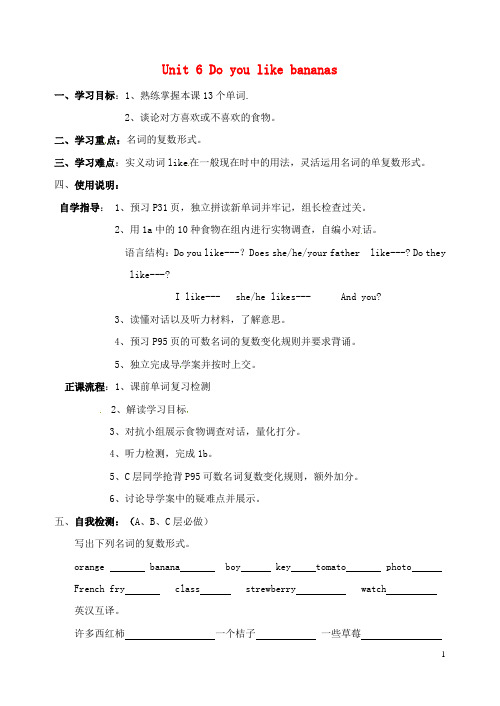
Unit 6 Do you like bananas一、学习目标:1、熟练掌握本课13个单词.2、谈论对方喜欢或不喜欢的食物。
二、学习重点:名词的复数形式。
三、学习难点:实义动词like在一般现在时中的用法,灵活运用名词的单复数形式。
四、使用说明:自学指导: 1、预习P31页,独立拼读新单词并牢记,组长检查过关。
2、用1a中的10种食物在组内进行实物调查,自编小对话。
语言结构:Do you like---?Does she/he/your father like---? Do theylike---?I like--- she/he likes--- And you?3、读懂对话以及听力材料,了解意思。
4、预习P95页的可数名词的复数变化规则并要求背诵。
5、独立完成导学案并按时上交。
正课流程:1、课前单词复习检测2、解读学习目标3、对抗小组展示食物调查对话,量化打分。
4、听力检测,完成1b。
5、C层同学抢背P95可数名词复数变化规则,额外加分。
6、讨论导学案中的疑难点并展示。
五、自我检测:(A、B、C层必做)写出下列名词的复数形式。
orange banana boy key tomato photo French fry class strewberry watch 英汉互译。
许多西红柿一个桔子一些草莓一个香蕉 three hamburgers some broccoli 用所给单词的适当形式填空。
Tom (watch) TV.Bill (like) ice cream.。
She (not have) a soccer ball.I ( not like) those bananas.翻译下列句子.1.我喜欢花椰菜。
____________________________________________________________2.我不喜欢橘子。
__________________________________________________________3.他喜欢西红柿.__________________________________________________________4.她不喜欢梨.____________________________________________________________5.你喜欢冰淇淋吗?不,我不喜欢_________________________________________________________6.你喜欢草莓吗?是的,我喜欢。
人教新版英语七年级上册Unit6说课稿

人教新版英语七年级上册Unit6说课稿尊敬的领导、同事,今天我要说的是人教版七年级英语上册Unit6 Do you like bananas?的第一课时。
本单元的中心话题是食物,主要语言功能项目是谈论喜好和厌恶,语法结构是现在时的to like,Yes/No问题和短回答。
n A的内容从呈现食物词汇开始,通过听、说、读等方式输入信息,并引出了本单元的主要句型:Do you like…?及其肯定回答Yes。
I do./否定回答No。
I don’t。
教学目标:学生能够掌握单词如hamburger,French fries,salad,ice cream,tomato,broccoli等等。
能够用英语谈论自己喜欢和不喜欢的食物。
通过丰富多彩的活动,让学生体会研究英语的快乐,谈论美食,享受生活美味。
了解中西方膳食的不同。
教学重点:1.掌握关于食物的词汇。
2.熟练运用所学功能项目谈论喜好和厌恶。
教学难点:1.交际用语Do you like…?肯定回答Yes。
I do.否定回答No。
I don’t。
第三人称单数:Does she/he like…?肯定回答Yes。
she/he does.否定回答No。
she/he XXX.一般现在时,主语是三单时,助动词与动词的变化。
3.掌握可数名词单,复数和不可数名词的区别。
教学方法和研究策略:以多媒体辅助教学,实物展示贯穿整个教学,增加直观性和趣味性,提高教学效果。
通过听、说、读、写、竞赛等多种类型的任务活动,增强学生合作意识和自主研究。
为了完成教学目标,达到培养学生的综合素质的目的,整个教学过程设计力求发挥学生的主体作用。
积极倡导自主、合作、探究的研究方式,并体会到成功。
教具准备:本课以多媒体课件为辅助教学手段。
生们已经被吸引住了。
为了让学生更好地理解和掌握新知识,教师通过提问的方式引导学生逐步掌握关于食物的单词和语法知识。
5.实物展示。
教师拿出苹果,香蕉,梨和桔子等水果进行实物展示,让学生通过观察和感受来了解这些水果的外观和口感特点。
七年级上册 Unit 6 do you like bananas课件Section A 1a-1c (非三人称)
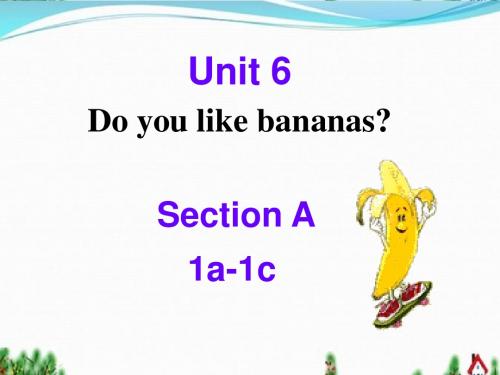
Do you like hamburgers? they Tom and Sally
Yes, I do. No , I don’t.
Yes, they do. No , they don’t.
Yes, they do. No , they don’t.
Do you
they Tom and Sally
1a Match the words with the things in the
picture. 1. hamburgers __ d i 2. tomatoes __ f 3. oranges __ 4. ice-cream h __ b 5. salad __ g 6. bananas __ 7. strawberries __ c j 8. pears __ 9. milk __ e a 10. bread__
Ice cream
I like…but I don’t like…
Exercise
一、选词填空。
√ 1. Do you like ___ (strawberry/strawberries)? √ 2. Here are some nice ___ (tomatos/tomatoes). √ / has) apples and bananas. 3. Let’s ___ (have
1c Pairwork
Practice the conversations above. Then make your own conversations. A: Do you like pears? B: No, I don’t. A: Do you like tomatoes? B: Yes, I do.
III. Translate and write them down. 1. - 你喜欢沙拉吗? - 我不喜欢。 - Do you like salad? - No, I don’t. 2. 我喜欢花椰菜,但我不喜欢炸薯条。 I like broccoli, but I don’t like French fries.
咸阳市第一中学七年级英语上册 Unit 6 Do you like bananas第一课时 Sect

(五)根据汉语意思完成以下句子。(5×5分=25分) 21.那些是西红柿。 Those ___a_r_e___ t_o_m_a_t_o_e_s_. 22.——你喜欢牛奶吗 ? ——是的 , 我喜欢。 —__D_o_____ you like milk? —Yes , _____I___ __d_o_____. 23.——她喜欢沙拉吗 ? ——不 , 她不喜欢。 —_D_o_e_s____ she like _s_a_l_a_d___ ? —No , _s_h_e_____do_e_s_n_'_t___.
24.八个梨在桌子上。 ___E_i_g_h_t_ ___p_e_a_r_s_ ___a_r_e___ on the table. 25.我的妹妹和我不喜欢汉堡包。 My sister and I __d_o_n_'_t__ __l_i_k_e___ h_a_m_b_u_r_g_e_r.s
四清导航
D. look
【答案]B
Summary
Words: sound; great;interesting Sentences:let's...& do you have...
Exercise
单项选择
( C )1.He ______baseball.
A. don‘t play
B. doesn’t plays
English is ___A____, but I am only ______ in Chinese. A.interesting/interested B. interesting/ interesting C. interested/ interested D. interested/ interesting
Unit6Doyoulikebananas(1)PPT课件(人教版英语七年级上册)

Can you tell John what Tom and Sally like and don’t like to eat?
Tom Sally
Likes
carrots, salad, all vegetables
salad, fruit (bananas, oranges, apples), ice-
8. pears j 9. milk e 10. bread a
初中英语
Sally talks about what she likes to eat.
Sally: I like
. Do you like
?
Tom: Yes, I do.
初中英语
What does Sally like to eat?
Likes
Tom Sally
carrots, salad, all vegetables
Doesn’t like apples
初中英语
初中英语
What do they like and what don’t they like to eat?
Likes
Tom Sally
carrots, salad, all vegetables
初中英语
初中英语
If you want to invite your classmates to your party, how do you find out what they like and don’t like to eat?
• Do you like …? • What’s your favorite fruit/vegetable/drink? • Do you enjoy …? • How about some …?
宜城市四中七年级英语上册Unit6Doyoulikebananas第一课时课件新版人教新目标版2
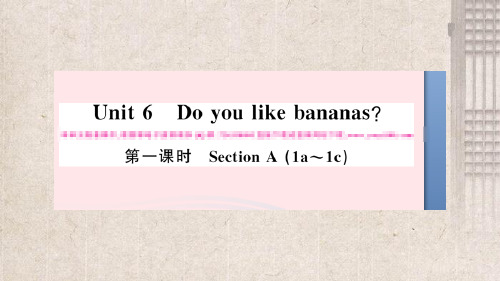
II. 根据汉语提示填空.
看看远处,要保护好眼睛哦~站起来动一动 对身体不好哦~
6. isn’t ____is__n_o_t_ (完全形式) 7. what is ___w__h_a_t’_s (缩写形式) 8. she is __s_h_e__’s (缩写形式) 9. hi __h_e_ll_o_ (近义词) 10. I’m ___I_a_m__ (完全形式)
3c
姓名游戏
Grammar
1.人称代词 :
在英语中, 表示人称代词的有I(我), you(你),
he(他), she(她), it(它), we(我们), you(你们),
they(他们/她们/它们)。
我们已经学到的人称代词有: I, you, he, she, it;
如:
I am Frank.
She is Linda. 她叫琳达。
3a Put the words in order to make conversations. Then practice them.
1.Байду номын сангаасyour name What’s Cindy I’m
What’s your name? I’m Cindy. 2. name his What’s Bob He’s
What’s his name? He’s Bob. 3. Mike you Are am I Yes
Complete the conversation and practice 3b it with your partner. 补全対话并与同伴练习。
A: Hi, _W_h_a_t_’s_ your name? B: My n__a_m_e_’s_ Gina. _A_r_e__ you Tom? A: _N__o___, I’m not. __I’_m____ Bob. B: Hi, _B_o_b___. __N_i_c_e__ to meet you.
- 1、下载文档前请自行甄别文档内容的完整性,平台不提供额外的编辑、内容补充、找答案等附加服务。
- 2、"仅部分预览"的文档,不可在线预览部分如存在完整性等问题,可反馈申请退款(可完整预览的文档不适用该条件!)。
- 3、如文档侵犯您的权益,请联系客服反馈,我们会尽快为您处理(人工客服工作时间:9:00-18:30)。
Unit 6 Do you like bananas?
Words
Teaching and Learning goals:
Learn about the food names in life, using “how about.......? think about......?”to talk about them in life.
Step 1 Warming up
Enjoy a song -------Are they apples?
Step 2 Preview
Learn new words by themselves before class. Make sure students can read most of the new words.
Step 3 Read and learn
Have students read the words after the tape. Then they can help each other in groups when necessary.
[设计说明]此环节主要是引导学生们自主学习单词及短语,对本单元的单词和短语实现初步的认读,遇到疑难可小组讨论,再不会由教师解决。
Step 4 Explain and check
The teacher shows the pictures about the words, and then ask some students to read. If possible, one by one.
[设计说明]通过图片学习单词,可以增强直观性,快速掌握这些单词,达到对单词由表及里的深入理解。
Step 5 编故事,学单词。
In my family, there are 3people.They are my father, my mother and I. My father likes eggs hamburgers and bread. How about my mother? She likes bananas, tomatoes, strawberries and pears. I like milk and ice-cream.
[设计说明]学生在掌握单个单词后,再把本单元的生词编成一段意义连贯的文字,并在本单元生词下面划线,学生能读懂文意,并获得信息,体会成功的快乐. 考查了学生们的综合运用能力,也拓展了学生们的理解、思维能力,实现对单词和短语的初步运用。
Eggs bread
hamburgers
实用文档 1
实 用 文 档 2
训练了思维。
Step 6 Mind-map
完成表格,书写自己家的故事。
vegetables fruits food father mother I
生们的掌握情况,也有利于教师及时进行调整。
Step 7 Dictation and check.
Have students write the words from the memory without their books. And then check each other.
Step 8 The end-of class test
A happy family
father
I
Milk ice-cream
mother
Bananas tomatoes pears
strawberries。
